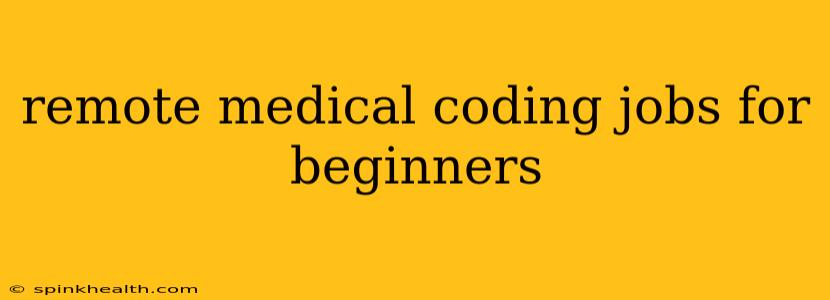Remote Medical Coding Jobs for Beginners: Your Journey to a Rewarding Career
The hum of the computer, the quiet click of the keyboard – this could be your new reality. Imagine working from home, setting your own hours (to a degree, of course!), and building a fulfilling career in a field that's both challenging and incredibly rewarding. That's the promise of remote medical coding jobs for beginners, and it's more attainable than you might think. But let's be honest, it's not just about finding a job; it's about embarking on a journey.
My name is Sarah, and I've been a medical coder for over ten years. I've seen the field evolve, and the increasing demand for remote coders is undeniable. This post isn't just a list of job boards; it's a guide to help you navigate this exciting path. Let's begin!
What Exactly is Medical Coding?
Before we dive into the job hunt, let's clarify what medical coding actually entails. In a nutshell, medical coders translate medical diagnoses, procedures, and services into numerical and alphanumeric codes. These codes are used for billing insurance companies, tracking patient health information, and conducting medical research. It's a critical part of the healthcare system, ensuring accurate and efficient financial processing. Think of it as the language that connects doctors, hospitals, and insurance providers.
Is Medical Coding a Good Career Choice for Beginners?
This is a question I get frequently. The short answer is: yes, but with caveats. Medical coding requires attention to detail, a strong understanding of medical terminology, and the ability to learn and adapt quickly. It's not a career you can jump into without any preparation, but it's definitely accessible with the right training and dedication. The flexibility and remote opportunities make it particularly attractive to beginners.
How Can I Find Remote Medical Coding Jobs for Beginners?
Finding your first remote medical coding job requires a multi-pronged approach:
-
Gain the Necessary Skills: This is non-negotiable. Complete a certified medical coding program (online options are abundant!). Focus on learning ICD-10-CM (International Classification of Diseases, 10th Revision, Clinical Modification) and CPT (Current Procedural Terminology) codes. These are the cornerstones of medical coding.
-
Build Your Resume: Highlight your coding certifications, any relevant coursework, and even volunteer experience (e.g., assisting at a doctor's office). A strong resume is your first impression.
-
Network: Connect with other medical coders online (LinkedIn is a great resource). Attend online webinars or join relevant Facebook groups to learn about industry trends and potential openings.
-
Job Boards: Websites like Indeed, LinkedIn, and ZipRecruiter regularly post remote medical coding positions. Be diligent in your searches and tailor your applications to each job description.
What are the Entry-Level Requirements for Remote Medical Coding Jobs?
Most entry-level positions require at least a certificate or diploma in medical coding from an accredited program. Some companies may prefer candidates with an associate's degree, but a certificate is often sufficient for beginners. Proficiency in medical terminology, anatomy, and physiology is crucial. Strong typing skills and computer literacy are also essential.
What Salary Can I Expect as a Beginner Remote Medical Coder?
Salaries vary depending on experience, location, and employer, but you can expect to earn a competitive wage, even as a beginner. While the exact numbers will vary, research online resources to get a better sense of salary ranges in your area.
What are Some Common Challenges Faced by Beginner Remote Medical Coders?
The transition to remote work can present challenges. Maintaining a structured work environment at home, managing distractions, and avoiding feelings of isolation are all things to be mindful of. Effective time management and clear communication with supervisors are key to overcoming these hurdles.
How Can I Stay Motivated and Productive While Working Remotely?
Staying motivated while working remotely requires self-discipline and proactive strategies. Setting realistic goals, establishing a dedicated workspace, and taking regular breaks can significantly improve productivity and well-being. Connecting with colleagues virtually and engaging in professional development activities can also help you stay engaged and motivated.
Embarking on a career in remote medical coding is a journey that takes dedication, but the rewards – both professionally and personally – are immense. The path may seem daunting at first, but with the right preparation, a positive attitude, and a touch of perseverance, you can achieve your dream of a fulfilling and flexible career. Remember, your journey starts with a single step. What are you waiting for?

